|
|
|
Sort Order |
|
|
|
Items / Page
|
|
|
|
|
|
|
| Srl | Item |
| 1 |
ID:
120706
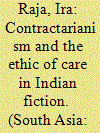

|
|
|
|
|
| Publication |
2013.
|
| Summary/Abstract |
Through close readings of recent fiction from English, Hindi and Kannada sources, this paper analyses the feminist ethic of care with reference to adult daughters caring for their critically-ill or dying mothers. The discussion focuses on problems associated with the care ethic and examines some of its assumptions, particularly its inability to account for the emotional complexity of adult caregiving relationships, which can make the invocation of relationality difficult; its focus on responsiveness to needs, such as those of helpless infants, which prevents adequate engagement with ideas of reciprocity; and, finally, its extraction of the caregiving relationship from the network of social and familial relationships in which it is embedded. Alongside my critique of the ethic of care, I will also examine the extent to which mainstream moral concepts, such as rights and contracts, may continue to be relevant to the dynamics of intergenerational relations in old age.
|
|
|
|
|
|
|
|
|
|
|
|
|
|
|
|
| 2 |
ID:
159752


|
|
|
|
|
| Summary/Abstract |
In Bangladesh, one of the world’s poorest countries, a significant proportion of its most deprived citizens are elderly women living in rural areas, where healthcare access remains difficult. This article argues that as citizens, such elderly women, too, should have a constitutional right to healthcare access. Meeting this constitutional and human rights challenge is a joint obligation for the government and healthcare professionals. Yet, socio-economic discrimination and several cultural factors at individual, societal and institutional levels are known to limit access to healthcare services for elderly rural women in Bangladesh, who represent a highly vulnerable population group in Bangladesh regarding healthcare and healthcare access. This article first examines demographic ageing trends and then highlights key issues concerning the necessity of securing better healthcare for rural elderly women (REW) in Bangladesh.
|
|
|
|
|
|
|
|
|
|
|
|
|
|
|
|
| 3 |
ID:
191117
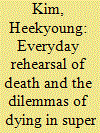

|
|
|
|
|
| Summary/Abstract |
In recent years, a new trend of performing a ‘good death’ has swept Japanese society. Popular, especially among the elderly, shūkatsu (終活) refers to the phenomenon of preparing for one's own demise through various practices, in particular, the writing of an ‘ending note (エンディングノート)’. A will designates the beneficiaries of one's estate or property after one's passing, whereas an ending note not only includes financial and legal matters, it goes far beyond that. It contains provisions for the deceased-to-be's end-of-life treatments, such as hospice care, as well as explicit instructions for seemingly mundane details such as the guest list, flower arrangements, and casket for one's funeral. This trend of engaging in shūkatsu can be viewed as a part of the biopolitics of a super-ageing Japanese society in which the elderly are now expected to manage all aspects of their own lives—including the disposal of their bodily remains when they pass away. Yet, as this anthropologically informed analysis discloses, such biopolitics also gives rise to a new set of ethical dilemmas for the elderly and their families, constituting a new form of politics of life and death. Indeed, rejecting the neoliberal injunction to efficiently separate death from life, many elderly try to recover—and resituate—death within the social and ethical realm of the living.
|
|
|
|
|
|
|
|
|
|
|
|
|
|
|
|
| 4 |
ID:
155077
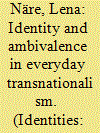

|
|
|
|
|
| Summary/Abstract |
This article analyses questions of belonging amongst elderly Gujaratis who live in North London but maintain connections with India and East Africa. Belonging, which encompasses both the sense and practices of belonging, is a useful concept for analysing identity-related matters. This research argues that identity and belonging are important for subjective and emotional well-being in old age. This target group practises belonging locally and through transnational mobility, which follows an annual rhythm. However, increasing bodily frailty related to ageing reduces this mobility. Moreover, this article examines belonging-related ambivalences that arise in old age and that stem from dislocation experiences and contradictions that individuals encounter when confronting racialised and patriarchal social structures. In conclusion, the article calls for the integration of older individuals’ experiences into the mainstream identity and belonging research.
|
|
|
|
|
|
|
|
|
|
|
|
|
|
|
|
| 5 |
ID:
120705
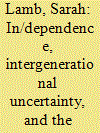

|
|
|
|
|
| Publication |
2013.
|
| Summary/Abstract |
This essay examines competing perspectives on old age security within contemporary Indian families and society. Ideas and policies concerning old age security are intricately connected to broader cultural meanings and values-surrounding personhood, the life course, family moral systems, and perceptions of the very nature and identity of a wider society and nation. The family in India has long been viewed as the central site of ageing and elder care, yet there is a widespread perception that family-centred elder care is on the decline. Market-based options such as for-pay old age homes are on the rise among the solvent urban middle classes, along with discourses emphasising the need for older individuals to rely on themselves. At the same time, recent parental care legislation and limited state-funded social security programs emphasise that family care is best. Confronting such developments, this essay explores competing Indian perspectives on: where is the best site of elder care: the family, the market, the state, or the individual? The aim is not only to illuminate important values, practices and policies being contested and fashioned in India today, but also to subject ostensibly a-cultural international models of old age security to cross-cultural scrutiny.
|
|
|
|
|
|
|
|
|
|
|
|
|
|
|
|
| 6 |
ID:
174696


|
|
|
|
|
| Summary/Abstract |
Demographic debates in the decades following the 1960s have shaped much of the discourse on population ageing across the world. This paper traces these discourses and research agendas that led to the understanding of demographic transitions in the developed and developing world. The policies were mostly articulated by demographers from the US and ageing was seen more as a challenge for the West. The questions addressed in this paper are that apart from the predictable and unchanging vulnerabilities of ageing voiced earlier by anthropologists and social workers in the 1940–1950s, what were the new risks being articulated by development experts? Once a diffused ‘world’ agenda was articulated and largely left adrift without resources, what were its afterlives? How did experts in various parts of the world redeploy the global ageing agenda and plan to assert various other alignments? Where did China and India figure in this? The paper locates the debates on India and China in the afterlives of the World Assembly on Ageing held in Vienna in 1982.
|
|
|
|
|
|
|
|
|
|
|
|
|
|
|
|
| 7 |
ID:
155075
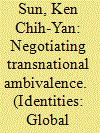

|
|
|
|
|
| Summary/Abstract |
This article uses older parents of parachute kids as an example to explore the ways in which the heads of transnational households assess intergenerational intimacy at a later stage of their life trajectories. I argue that transitioning to a later life stage motivates or even demands older parents reorient their perspectives on the separation from their children overseas. Specifically, I offer the concept of transnational ambivalence to analyse the processes whereby older parents grapple with the meaning of being physically separated from their children. This study demonstrates how the interplay between extended family separation and human ageing provokes complex feelings and emotions among parents. In addition, this research chronicles the factors that explain the variation in parental ambivalence. In so doing, this article contributes to the literature on transnational families by illuminating the temporal reflexivity of parents ‘left behind’.
|
|
|
|
|
|
|
|
|
|
|
|
|
|
|
|
| 8 |
ID:
174698


|
|
|
|
|
| Summary/Abstract |
This study aims to summarise the characteristics of elderly care system and analyse expenditures of healthcare for the elderly in Shanghai. The authors use medical records of 2015 and health account results of 2014 based on System of Health Accounts 2011 to describe the pattern of care expenditures for elderly. Individuals aged 60 years and above account for 19.5 per cent of Shanghai’s population but utilise 52.2 per cent of all outpatient visits and 45.3 per cent of all hospitalisations. Almost two-thirds of their medical expenditures occur in hospitals and 16 per cent in community health centres, corresponding to the status of resource allocation. The out-of-pocket payment ratio of the elderly is lower than that of the younger adults, which is attributable to the preferential reimbursement polices set by the insurance schemes. The leading causes of expenditures are cardiovascular disease, neoplasms and respiratory diseases. Care for the elderly costs more, and the elderly use more services than other age groups. The article recommends the monitoring of irrational utilisation of services, strengthening of primary level care and integration of services across different facilities to streamline care for elderly in Shanghai.
|
|
|
|
|
|
|
|
|
|
|
|
|
|
|
|
| 9 |
ID:
155076
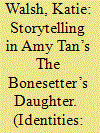

|
|
|
|
|
| Summary/Abstract |
Amy Tan’s The Bonesetter’s Daughter is a fictional account of a Chinese American woman and her mother, a first-generation migrant, who is negotiating dementia in later life. Analysis of diasporic novels can provide insight into migrant belonging, especially the emotional geographies of home and emotional subjectivities of ageing that are not commonly or easily elucidated even by qualitative interviewing methods. This article examines Tan’s construction of ageing as an intergenerational, cultural and emotional process, and highlights the role of storytelling as an everyday home-making practice through which the transnationality of home in older age becomes evident.
|
|
|
|
|
|
|
|
|
|
|
|
|
|
|
|
| 10 |
ID:
101199
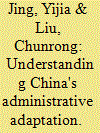

|
|
|
|
|
| Publication |
2010.
|
| Summary/Abstract |
This paper provides an alternative perspective on the post-1978 incremental adaptation of the Chinese administrative state. Unlike other studies that focus on the centralized reforms of the rationalized state or fragmentation and competition within the state, this paper analyzes the neglected strategies of self-empowerment adopted by weak administrative organizations and the subsequent impacts on administrative adaptation from an institutional-organizational perspective. Our case study on the organizational dynamics of ageing management suggests that weak or-ganizations, as peripheral insiders of the regime, are aware of their weakness and are skillful in utilizing mixed strategies, in a risk-averse way, to take advantage of the opportunities and resources emerging from the increasingly plural and diverse institutional environment. Most notably,these organizations partially assume and partially offset the role of the potentially disobedient external organization. Overall, their behavior creates and enlarges the pores through which modern administrative values and practices penetrate the transitional Chinese administrative state.
|
|
|
|
|
|
|
|
|
|
|
|
|
|
|
|
|
|
|
|
|